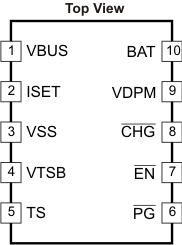SLUSA76B December 2010 – January 2015
PRODUCTION DATA.
- 1 Features
- 2 Applications
- 3 Description
- 4 Typical Application Schematic
- 5 Revision History
- 6 Pin Configuration and Functions
- 7 Specifications
-
8 Detailed Description
- 8.1 Overview
- 8.2 Functional Block Diagram
- 8.3 Feature Description
- 8.4
Device Functional Modes
- 8.4.1 Power-Down or Undervoltage Lockout (UVLO)
- 8.4.2 Operation Mode Detection and Transition
- 8.4.3 Sleep Mode
- 8.4.4 Load Mode
- 8.4.5
Charge Mode
- 8.4.5.1 Overvoltage Protection (OVP) - Continuously Monitored
- 8.4.5.2 Power Up
- 8.4.5.3 Battery Detect Routine
- 8.4.5.4 New Charge Cycle
- 8.4.5.5 BAT Output
- 8.4.5.6 Fast Charge Current (IOUT)
- 8.4.5.7 Termination
- 8.4.5.8 Timers
- 8.4.5.9 Battery Temperature Monitoring
- 8.4.5.10 Limited Power Charge Mode - TS Pin High
- 8.4.6 Suspend Mode
- 9 Application and Implementation
- 10Power Supply Recommendations
- 11Layout
- 12Device and Documentation Support
- 13Mechanical, Packaging, and Orderable Information
Package Options
Mechanical Data (Package|Pins)
- DQC|10
Thermal pad, mechanical data (Package|Pins)
- DQC|10
Orderable Information
6 Pin Configuration and Functions
DQC Package
10 Pins
